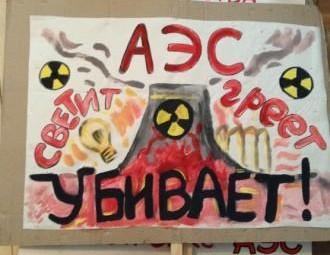Tatsiana Novikava: Belarusan nuclear power plant can only be safe when not working

Negligence in the building of the nuclear power plant can turn into a new Chernobyl catastrophe for Belarus.
Since the time when the building of the Belarusan nuclear power plant was announced in Astravets, ecologists and public activists were trying to reach out to the authorities, asking to stop the realization of this initiative. When the project and loan papers for the building of the station were signed, they started watching the ongoing works.
At the meeting dedicated to the 28-th anniversary of the Chernobyl catastrophe, Tatsiana Novikava, an activist of the Belarusan anti-nuclear campaign, gave very convincing arguments against the building of nuclear power plant in Belarus.
Tatsiana Novikava believes that the building of the nuclear power plant endangers the health of the nation. According to the Russian professor Igor Berman, radioactive nuclides will regularly reach atmosphere, even if the NPP works without any accidents.
“The results of numerous research and experiments prove that a human body is incapable of accommodating to the damaging influence of radiation. And as it is known, the Belarusans have already suffered from the radioactive discharge”, says Tatsiana Novikava.
For Belarus, the ecological consequences are supplemented by the huge economic losses.
Back in 2008, the alleged cost of the Belarusan NPP was 2 billion dollars; whereas after two years the cost of the project was estimated at 10 billion dollars, not counting the infrastructure. Besides, the country will have to spend vast sums of money for additional systems.
Later Belarus will have to loan money from China for the building of the power delivery system. This loan is estimated at 322,8 million dollars.
The activist of the Belarusan anti-nuclear campaign also recalls the necessity to build a power plant of the same plant output as the NPP, but using the different type of fuel. And the building of that power plant will also require considerable investment.
Radioactive waste recycling is one more item of expenses.
The ecologists are convinced that talks about the safety of the power plant are a flat out lie, as the building of the NPP started without preliminary calculations, and only after that it was legalized.
“The building of the reactor started before the project documentation was obtained, although it can be done only after the license is approved”.
Tatsiana Novikava is convinced that after such violations Belarusan nuclear power plant can only be safe in case it never starts working.
Besides, the technologies that are to be used at the Belarusan NPP were never tested in practice, while the reactor will be built at the factory that wasn’t doing it since the 70s.
“If we sum it up, it becomes clear that there can be no guarantee that the work of the nuclear power plant will be efficient and safe”, - summarizes Tatsiana Novikava.
For now all the efforts and attempts of the ecologists and activists to reach out to the competent officials, who are in charge of the building of the station and project realization, get no reaction.
-
03.01
-
07.10
-
22.09
-
17.08
-
12.08
-
30.09



























